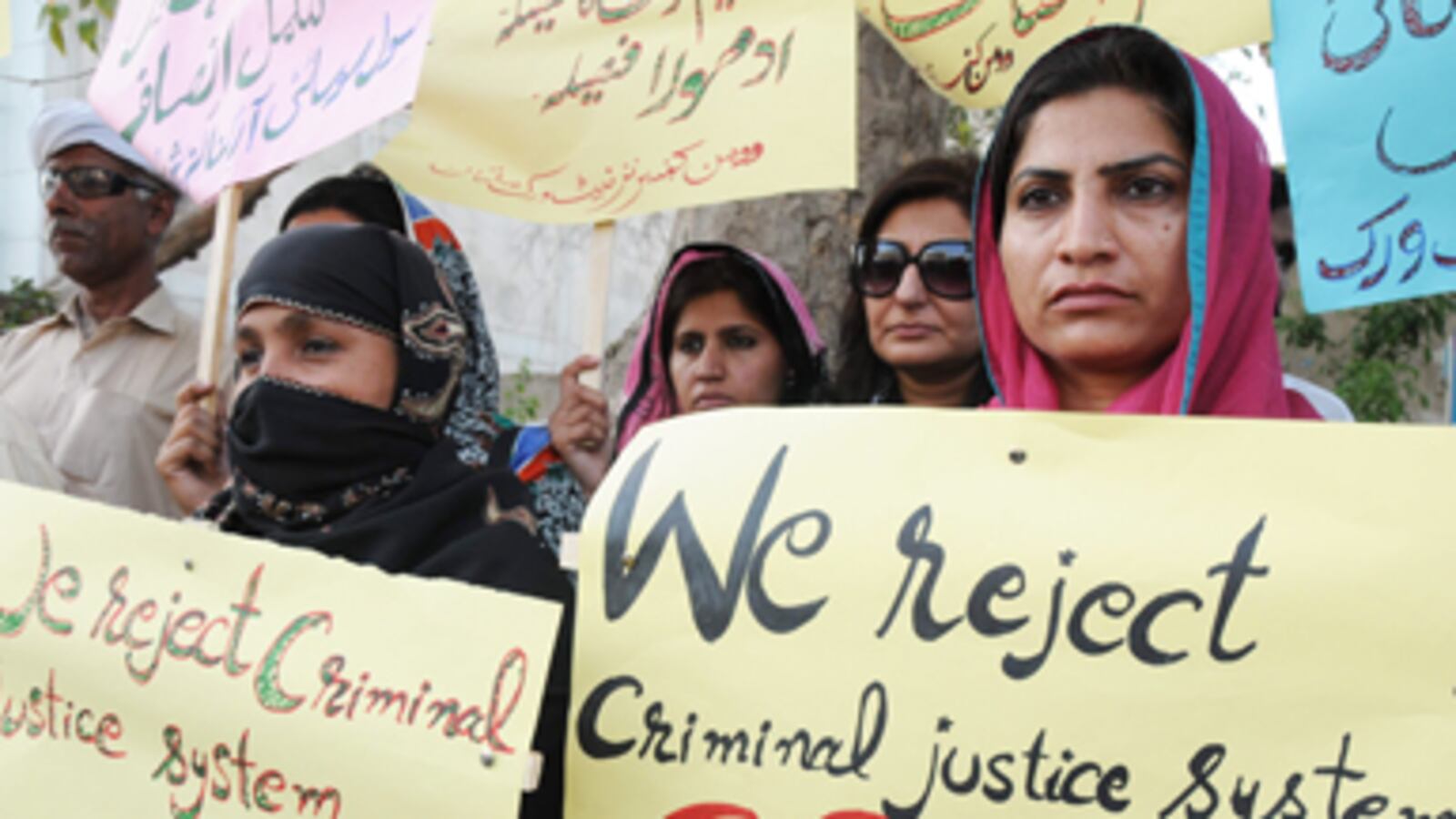Pakistan’s Supreme Court has ended Mukhtar Mai’s quest for legal justice against the men accused of gang-raping her in a case that won international attention and made Mukhtar a global symbol of women who dare to speak out against rape. Five of the six men accused of her rape are now free.

Mukhtar’s 2002 rape was “punishment” for a crime she did not commit: her young brother’s alleged relations with a girl from another clan. Questions continue to surround the original case. As penalty for her brother’s alleged offense and following tribal customs, a local council in Mukhtar’s rural southern Punjab province allegedly meted out Mukhtar’s public gang-rape. Mukhtar, then 30, was later paraded naked to add to the humiliation.
Rarely do women in Pakistan speak out when such acts are committed against them. In fact, many such cases end when the women who have been victimized commit suicide. But Mukhtar shocked Pakistan and galvanized human-rights organizations and international supporters by refusing to be silent about her rape. She spoke out and took her case to court, testifying publicly against the men she said were her attackers. When the government later compensated her as the media attention surrounding her case grew, Mukhtar used the funds to start a school for girls in her home village, enrolling herself among the school’s first students.
Since 2002, Mukhtar has fought for justice as her alleged rapists have been convicted and then acquitted in a dizzying series of decisions and reversals.
The court asserted that though the facts of Mukhtar's case were likely to be true, it still found room for doubt when it came to convicting.
Rights advocates who have worked with Mukhtar say they fear for her safety now that her accusers are free.
“The complainant’s allegation of being gang raped may not be false but in such a situation where one of the accused, Fayyaz, is being given benefit of doubt and acquitted of the charge of rape, and there was no light in the room where the incident took place, it may be unsafe to convict the other two accused of offense under Section 10(4) of Offense of Zina (Enforcement of Hadood) Ordinance, 1979,” the three-member Supreme Court said in its decision Thursday. The court upheld the aquittal of the charges against five of the men accused in the gang-rape; a sixth has been sentenced to life in prison.
Mukhtar, for her part, says she will not be stopped just because the high court shut down her case. Already she is speaking out against her country’s legal system.
“Supreme Court's verdict proves that police dictate justice system in Pakistan,” Mukhtar said via Twitter shortly after the announcement of the decision. “No court can weaken my resolve to stand against injustice.”
U.S. diplomats who have followed her case expressed their grave disappointment with the decision. "I know Mukhtar, and she told me about the brutal gang rape she had endured and the struggle she'd mounted for justice in her case," said Melanne Verveer, U.S. Ambassador for Global Women's Issues. "The perpetrators of this horrific crime—and violence against women and girls whereever it occurs—need to be punished not absolved."
Rights advocates who have worked with Mukhtar say they fear for her safety now that her accusers are free.
“Mukhtaran has spent nine years of her life fighting this case through the legal system of Pakistan, which today has failed her,” said Alyse Nelson of the global women’s leadership organization Vital Voices. “We strongly urge the government of Pakistan to protect her.” Mukhtar's case was featured at the 2010 Women in the World summit, hosted by The Daily Beast, in the play Seven.
And representatives of Vital Voices and other rights groups say the verdict is sure to be heard by all women who fight back against crimes committed against them.
“It is just shocking what has happened,” said Susan Davis, chairwoman of Vital Voices. “It is not only unjust but it sends a terrible message to women around the world that they can’t speak out for themselves and that the system doesn’t work for them.”
Gayle Tzemach Lemmon is the Deputy Director of the Women and Foreign Policy Program at the Council on Foreign Relations. She has spent the last five years reporting on women entrepreneurs in conflict and post-conflict regions, including Afghanistan, Rwanda and Bosnia. Her upcoming book, The Dressmaker of Khair Khana , tells the story of a young Afghan entrepreneur whose business created jobs and hope for women in her neighborhood during the Taliban years. The Dressmaker of Khair Khana will be published by HarperCollins in March 2011.





